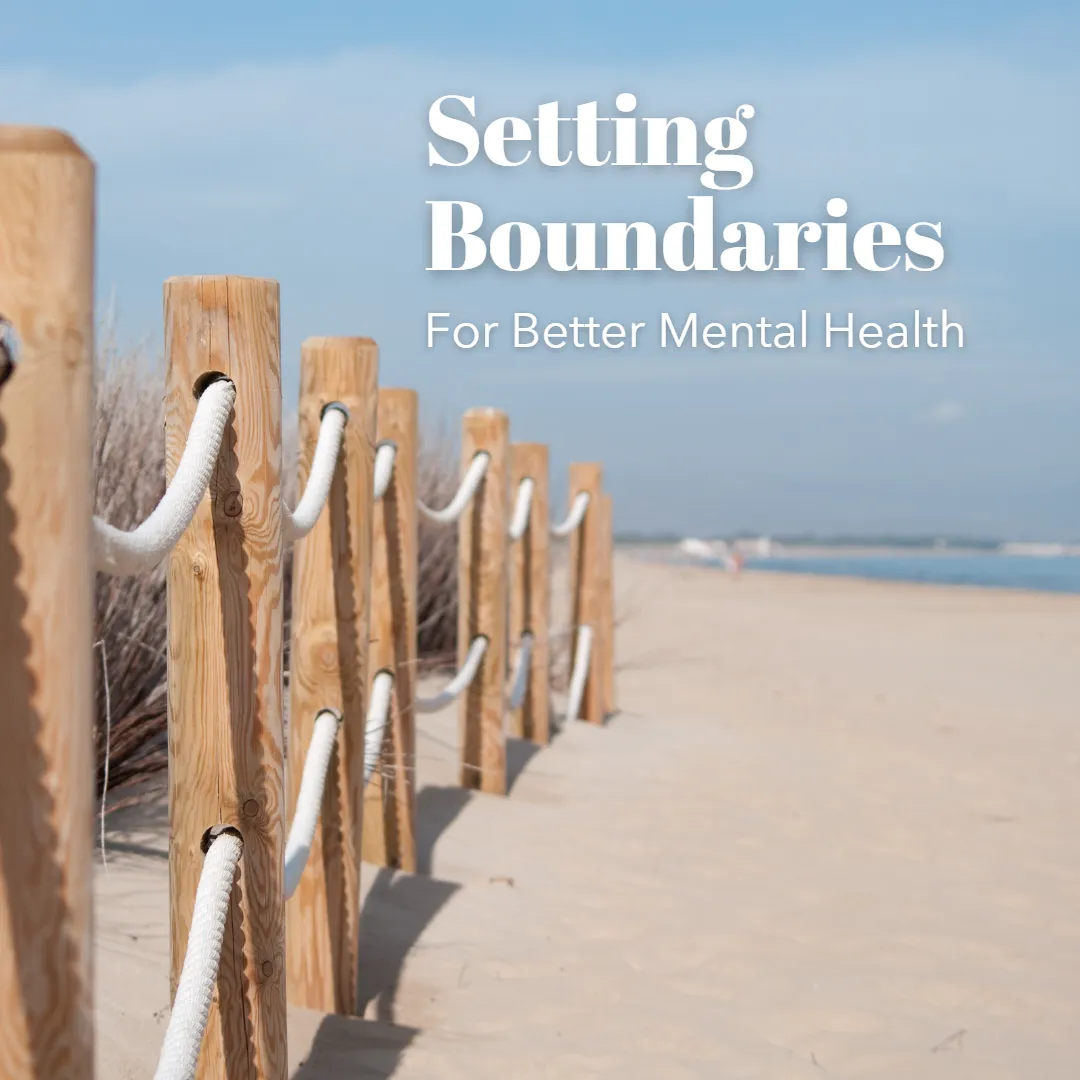Blog

Setting Boundaries for Better Mental Health
Boundaries are an essential part of maintaining mental health and well-being. They are the personal limits and guidelines that we establish for ourselves and communicate to others about how we want to be treated. In the realm of mental health, setting boundaries is not just important, it's crucial.
Boundaries can be physical, emotional, or mental. Physical boundaries might include personal space or touch, emotional boundaries might involve protecting your feelings, and mental boundaries relate to your thoughts and ideas. For example, you might set a boundary by telling a friend that you don't appreciate it when they make negative comments about your appearance (emotional boundary), or by deciding not to engage in work-related tasks after a certain time in the evening (mental boundary).
Setting boundaries contributes significantly to self-care, preventing burnout, maintaining healthy relationships, promoting personal growth, protecting mental and emotional space, and fostering self-esteem and assertiveness. When we set boundaries, we are essentially taking care of our mental health, ensuring we're not overextending ourselves or letting others infringe on our time and energy.
In a blog post titled "11 things you should never apologize for, according to psychologists", author Jelena Dincic emphasizes the importance of setting boundaries. These insights align with the importance of setting boundaries for mental health. As Dincic puts it, "Your life belongs to you and that means that you have every right to set boundaries. These boundaries define how you want to be treated and how you interact with others. They’re the emotional, physical, and psychological limits that help protect your well-being."
Practical Steps to Set Boundaries
Setting boundaries involves a few key steps:
Identify Your Limits: Reflect on past experiences and identify situations that made you uncomfortable or caused resentment. These are indicators of your personal limits.
Communicate Clearly: Once you've identified your boundaries, communicate them clearly and assertively to others. Remember, it's not what you say, but how you say it.
Be Consistent: Consistency is key in maintaining boundaries. It might be challenging at first, but with practice, it will become easier.
Practice Self-Awareness: Be aware of your feelings and emotions. If you're feeling uncomfortable or resentful, it might be a sign that your boundaries are being crossed. You can cultivate self-awareness through journaling.
Prioritize Self-Care: Make sure to take care of your physical, emotional, and mental well-being. It's not selfish to prioritize your own needs and feelings.
How Hypnotherapy & Mindset Coaching Can Help
Hypnotherapy and mindset coaching are powerful tools that can facilitate the process of setting and maintaining boundaries.
Hypnotherapy taps into the power of your subconscious mind, helping you to uncover and address the deep-seated beliefs and experiences that may be influencing your current boundary-setting behaviors. It can assist you in reshaping these beliefs and creating new, healthier patterns of behavior.
Mindset coaching, on the other hand, focuses on your conscious thought processes and attitudes. It helps you develop the assertiveness and self-awareness needed to enforce your boundaries consistently and deal with any pushback you might receive from others.
Whether you're struggling with setting boundaries in your personal life or professional relationships, these services can provide the support and guidance you need to navigate these challenges effectively.
If you're ready to take the next step in setting boundaries and improving your mental health, consider working with a professional therapist, hypnotherapist or mindset coach to help you develop personalized strategies and techniques for promoting mental health and wellness.
Complimentary Tools and Resources are available below:
Complimentary 30-min Consultation: During this client intake you will receive a personalized recommendation to help you achieve your goals and 6 complimentary audio recordings valued at $99.
Complimentary eBook: "Dear Inner Bestie" for valuable insights and guidance on nurturing your inner self and improving your mental well-being.
Sharon Lee Hypnosis YouTube Channel: Complimentary Guided Meditation and Hypnosis videos designed to help you achieve mental health and wellness. These videos offer a range of practices for different needs, including relaxation, stress reduction, and sleep improvement.
In conclusion, setting boundaries is not just about saying "no" to others, but also about saying "yes" to ourselves. It's about respecting our own needs, feelings, and well-being. So, let's start setting boundaries and never apologize for taking care of our mental health.
Blog

Setting Boundaries for Better Mental Health
Boundaries are an essential part of maintaining mental health and well-being. They are the personal limits and guidelines that we establish for ourselves and communicate to others about how we want to be treated. In the realm of mental health, setting boundaries is not just important, it's crucial.
Boundaries can be physical, emotional, or mental. Physical boundaries might include personal space or touch, emotional boundaries might involve protecting your feelings, and mental boundaries relate to your thoughts and ideas. For example, you might set a boundary by telling a friend that you don't appreciate it when they make negative comments about your appearance (emotional boundary), or by deciding not to engage in work-related tasks after a certain time in the evening (mental boundary).
Setting boundaries contributes significantly to self-care, preventing burnout, maintaining healthy relationships, promoting personal growth, protecting mental and emotional space, and fostering self-esteem and assertiveness. When we set boundaries, we are essentially taking care of our mental health, ensuring we're not overextending ourselves or letting others infringe on our time and energy.
In a blog post titled "11 things you should never apologize for, according to psychologists", author Jelena Dincic emphasizes the importance of setting boundaries. These insights align with the importance of setting boundaries for mental health. As Dincic puts it, "Your life belongs to you and that means that you have every right to set boundaries. These boundaries define how you want to be treated and how you interact with others. They’re the emotional, physical, and psychological limits that help protect your well-being."
Practical Steps to Set Boundaries
Setting boundaries involves a few key steps:
Identify Your Limits: Reflect on past experiences and identify situations that made you uncomfortable or caused resentment. These are indicators of your personal limits.
Communicate Clearly: Once you've identified your boundaries, communicate them clearly and assertively to others. Remember, it's not what you say, but how you say it.
Be Consistent: Consistency is key in maintaining boundaries. It might be challenging at first, but with practice, it will become easier.
Practice Self-Awareness: Be aware of your feelings and emotions. If you're feeling uncomfortable or resentful, it might be a sign that your boundaries are being crossed. You can cultivate self-awareness through journaling.
Prioritize Self-Care: Make sure to take care of your physical, emotional, and mental well-being. It's not selfish to prioritize your own needs and feelings.
How Hypnotherapy & Mindset Coaching Can Help
Hypnotherapy and mindset coaching are powerful tools that can facilitate the process of setting and maintaining boundaries.
Hypnotherapy taps into the power of your subconscious mind, helping you to uncover and address the deep-seated beliefs and experiences that may be influencing your current boundary-setting behaviors. It can assist you in reshaping these beliefs and creating new, healthier patterns of behavior.
Mindset coaching, on the other hand, focuses on your conscious thought processes and attitudes. It helps you develop the assertiveness and self-awareness needed to enforce your boundaries consistently and deal with any pushback you might receive from others.
Whether you're struggling with setting boundaries in your personal life or professional relationships, these services can provide the support and guidance you need to navigate these challenges effectively.
If you're ready to take the next step in setting boundaries and improving your mental health, consider working with a professional therapist, hypnotherapist or mindset coach to help you develop personalized strategies and techniques for promoting mental health and wellness.
Complimentary Tools and Resources are available below:
Complimentary 30-min Consultation: During this client intake you will receive a personalized recommendation to help you achieve your goals and 6 complimentary audio recordings valued at $99.
Complimentary eBook: "Dear Inner Bestie" for valuable insights and guidance on nurturing your inner self and improving your mental well-being.
Sharon Lee Hypnosis YouTube Channel: Complimentary Guided Meditation and Hypnosis videos designed to help you achieve mental health and wellness. These videos offer a range of practices for different needs, including relaxation, stress reduction, and sleep improvement.
In conclusion, setting boundaries is not just about saying "no" to others, but also about saying "yes" to ourselves. It's about respecting our own needs, feelings, and well-being. So, let's start setting boundaries and never apologize for taking care of our mental health.




